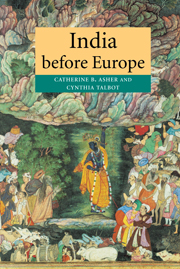Book contents
- Frontmatter
- Contents
- List of illustrations
- List of maps
- Preface
- Glossary
- Place names: alternative spellings
- 1 Introduction: situating India
- 2 The expansion of Turkic power, 1180–1350
- 3 Southern India in the age of Vijayanagara, 1350–1550
- 4 North India between empires: history, society, and culture, 1350–1550
- 5 Sixteenth-century north India: empire reformulated
- 6 Expanding political and economic spheres, 1550–1650
- 7 Elite cultures in seventeenth-century South Asia
- 8 Challenging central authority, 1650–1750
- 9 Changing socio-economic formations, 1650–1750
- Epilogue
- Biographical notes
- Bibliography
- Index
8 - Challenging central authority, 1650–1750
Published online by Cambridge University Press: 05 June 2014
- Frontmatter
- Contents
- List of illustrations
- List of maps
- Preface
- Glossary
- Place names: alternative spellings
- 1 Introduction: situating India
- 2 The expansion of Turkic power, 1180–1350
- 3 Southern India in the age of Vijayanagara, 1350–1550
- 4 North India between empires: history, society, and culture, 1350–1550
- 5 Sixteenth-century north India: empire reformulated
- 6 Expanding political and economic spheres, 1550–1650
- 7 Elite cultures in seventeenth-century South Asia
- 8 Challenging central authority, 1650–1750
- 9 Changing socio-economic formations, 1650–1750
- Epilogue
- Biographical notes
- Bibliography
- Index
Summary
The roughly hundred years from 1650 to 1750 were marked by a series of radical political and social changes in South Asia. Many of these changes were triggered by developments that transpired during the nearly fifty-year reign of the sixth Mughal emperor, Aurangzeb (r. 1658–1707). This Mughal emperor remains the most controversial in the popular mind and even, to some extent, in scholarly literature. Aurangzeb is often compared unfavorably with Akbar, whose reign also spanned close to half a century. In part, this is due to the work of J. N. Sarkar, the first modern historian to write extensively on Aurangzeb. Sarkar held Aurangzeb personally responsible for the reversal of the tolerant policies first fostered by Akbar, which were instrumental in unifying the vast territories of the Mughal empire in the minds of many scholars. Instead, in Sarkar's view, Aurangzeb promoted an aggressively Islamic state that discriminated against Hindus and other non-Muslims, leading to a loss of unity and the decline of empire. Other scholars have accused Aurangzeb of weakening the empire not so much by his orthodox religious stance as by his prolonged campaign to pacify and annex the Deccan.
In this chapter, we look at both these charges against Aurangzeb, as well as at the Maratha community which opposed Mughal expansion fiercely, and at political developments after Aurangzeb's death.
- Type
- Chapter
- Information
- India before Europe , pp. 225 - 255Publisher: Cambridge University PressPrint publication year: 2006



